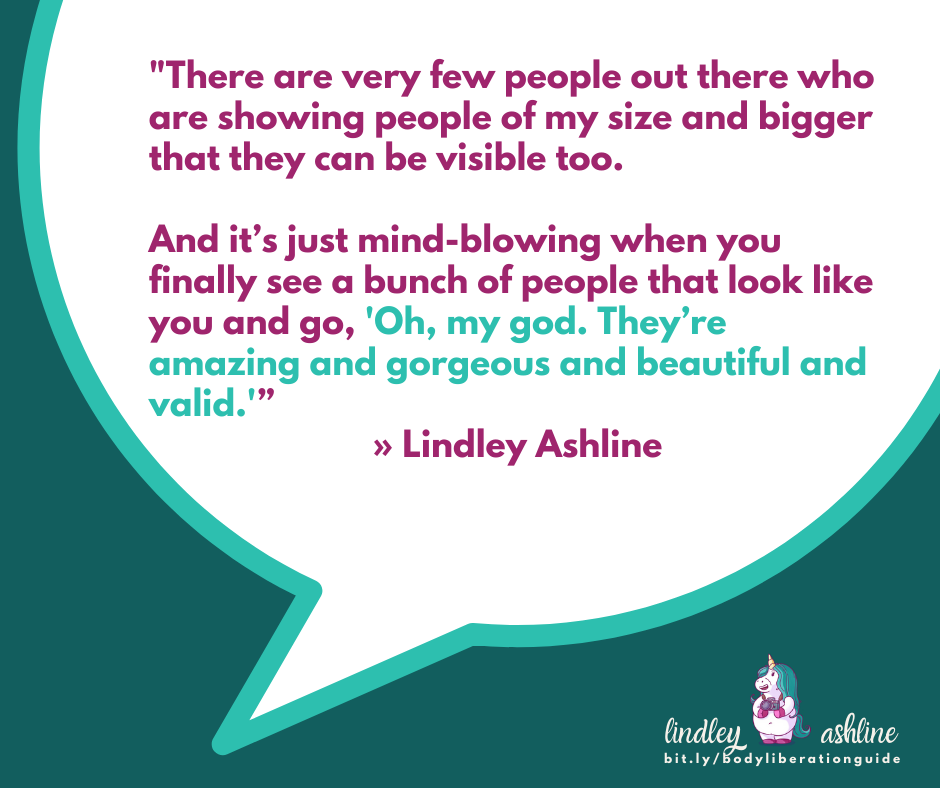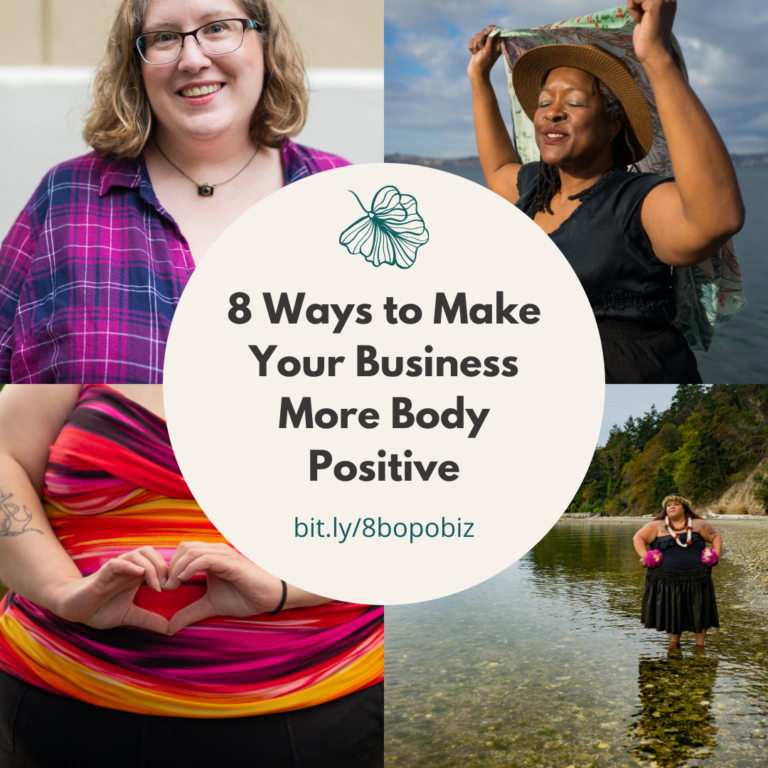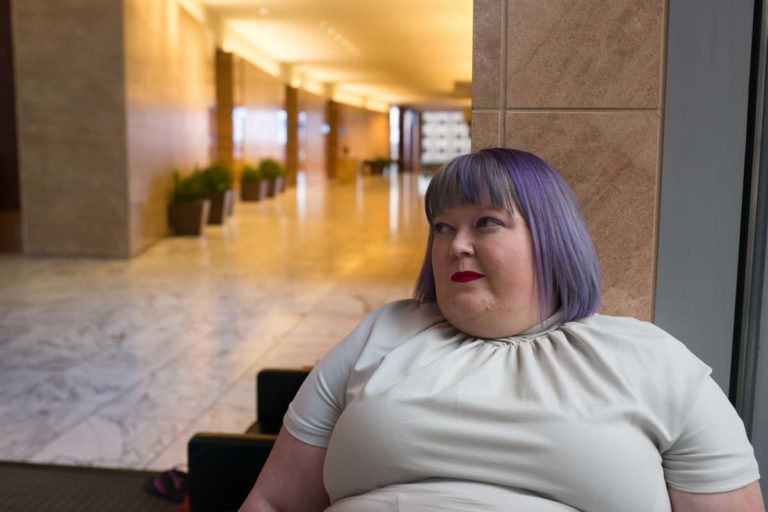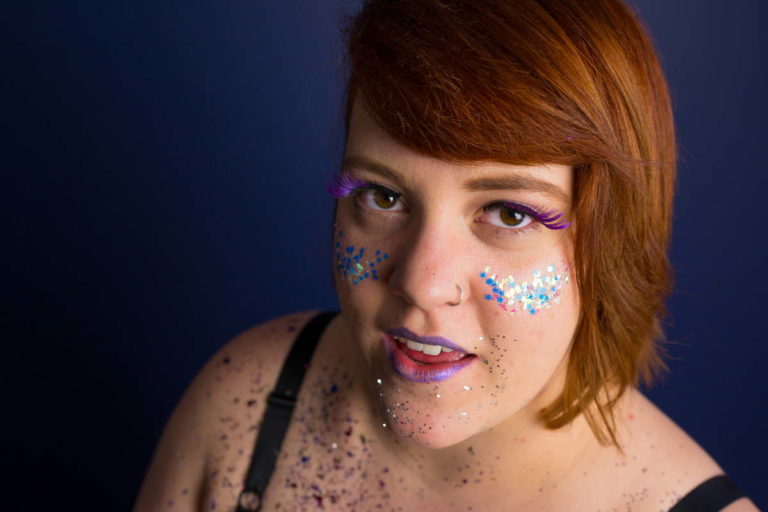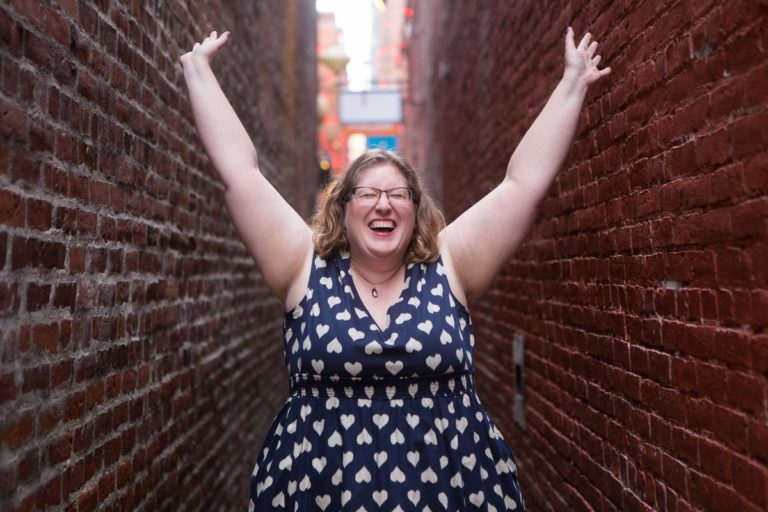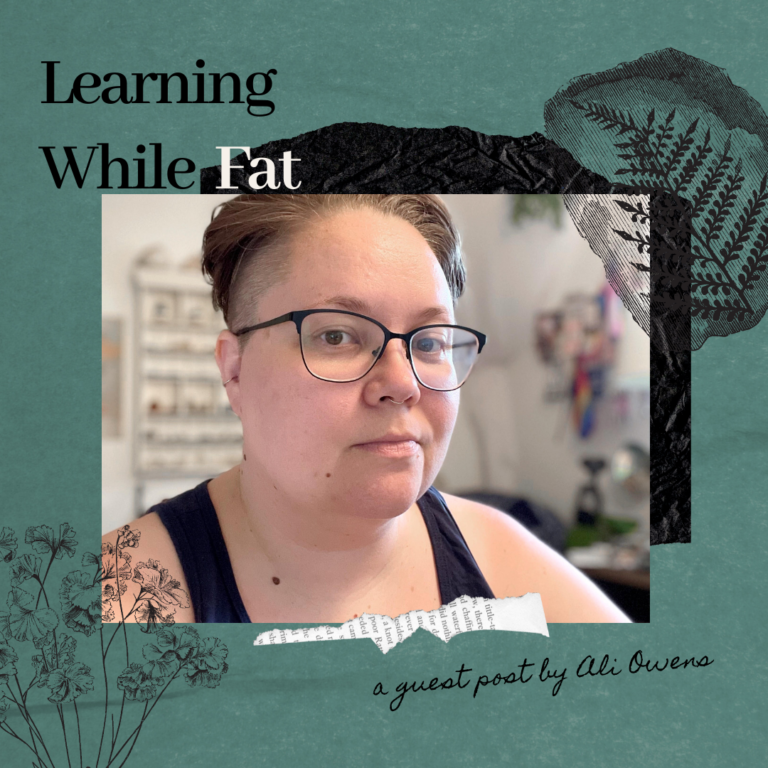WATCH: Lindley on living unapologetically with Alissa Rumsey
Image description: A teal square with a chat bubble graphic and the text, “”There are very few people out there who are showing people of my size and bigger that they can be visible too. And it’s just mind-blowing when you finally see a bunch of people that look like you and go, ‘Oh, my god. They’re amazing and gorgeous and beautiful and valid.’” » Lindley Ashline. Lindley’s logo is at the bottom.
What does it mean to live authentically and unapologetically? What kinds of shifts do you need to make in your life to be unapologetic? And what kind of support do you need to make that change?
In this Instagram live video, intuitive eating coach and nutritionist Alissa Rumsey (@alissarumseyrd) and I explore these topics and more. Watch in the video above, or read the transcript below.
Transcript
Alissa Rumsey: Hey, everybody. Welcome to Day 3 of the Unapologetic Eating Interview Series. We’re going to be on here shortly with Lindley Ashline.
Hi, people joining. Hi, everybody. Hey. Hey, Joanie. If you are joining us, feel free to say hi. Let us know where you’re joining in from today. We’re going to get Lindley on here in just a minute. Hi, hi. Hi, mom. Hey, all.
From the UK. Hi, Vanessa. People from all over today.
Lindley Ashline: Hi.
Alissa Rumsey: Hi, Lindley. Hey. How are you?
Lindley Ashline: Good. I love that your mom is here. Hi, Alissa’s mom.
Alissa Rumsey: Yes, she’s so supportive. She’s been every day, I think, this week so far.
Lindley Ashline: I love it. I love it.
Alissa Rumsey: Okay, so as people are still joining us, but we can get started. So welcome to Day 3 of the Unapologetic Eating Interview Series. I’m doing this series over the two weeks leading up to my book launch on February 9th. And I just really wanted to bring together people who I really respect, and admire, and have learned so much from over the years, and to talk to them about what being unapologetic means to them, and the impact it’s had in their life.
So today, I have Lindley Ashline. Did I say your last name correctly?
Lindley Ashline: It’s Ashline. It’s exactly like it’s spelled.
Alissa Rumsey: Okay, Ashline. This is so funny. I feel like I’m doing this every day because you know when just in your head, you see the name and you say it like a certain way.
Lindley Ashline: Absolutely.
Alissa Rumsey: I’m so excited. Thank you so much, Lindley, for joining me today. I’ve been following your work for years now, first from your Body Liberation Photos that you’ve had. Fun fact, Lindley actually worked with me. I hired her as an equity consultant on my book. So she has seen the back end of that and worked with me last year on that. And I just really appreciate everything that you share, and all of your expertise.
But for people actually who may not be as familiar with you or your work, could you just introduce yourself and tell us a little bit more about you and what you do?
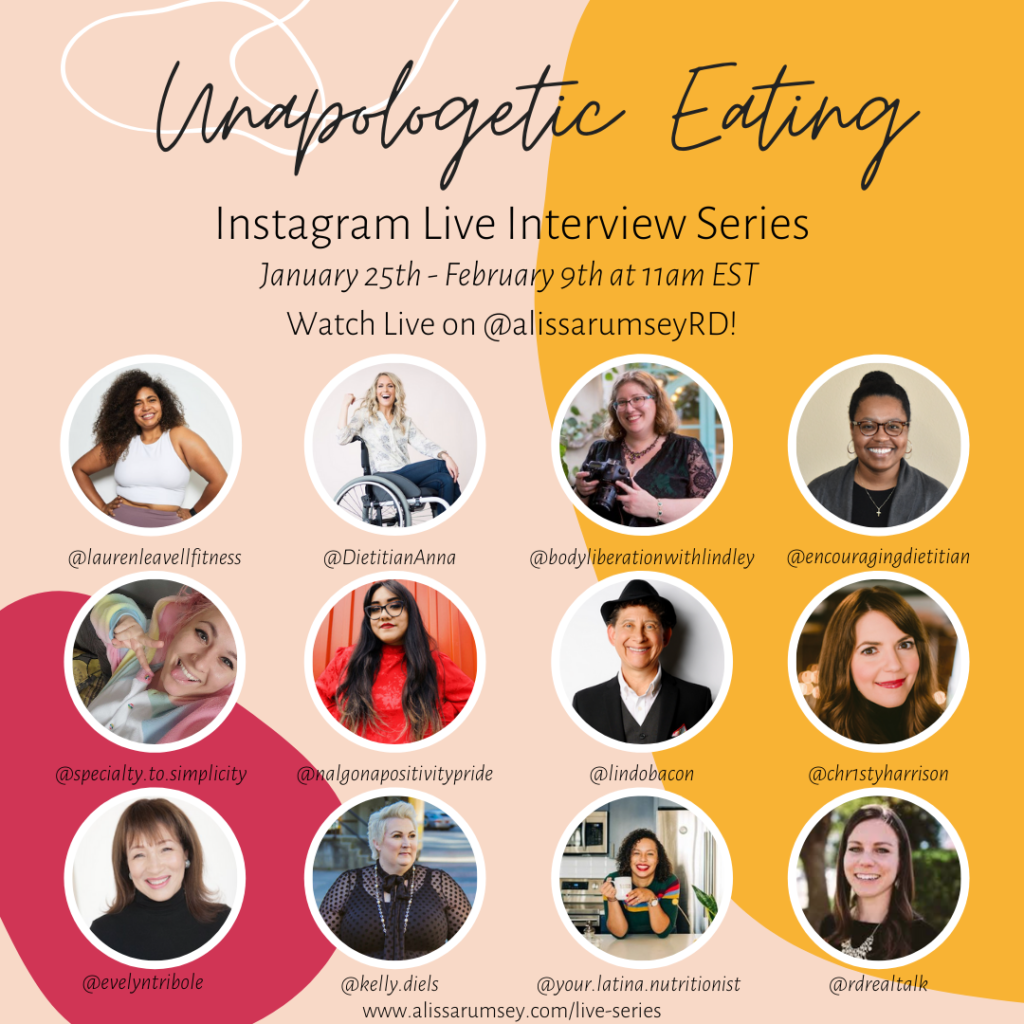
Lindley Ashline: Yes, so this is a really exciting opportunity to talk about being unapologetic because everything that I currently do had stemmed from being increasingly unapologetic in my own life. So the topic is so cool. But my name is Lindley, L-I-N-D-L-E-Y Ashline, and I use she/her pronouns. I live outside Seattle, Washington. And I do a little bit of a lot of things.
I’m a professional photographer in non-COVID-19 times. I do portrait, boudoir, small business photography, small business branding. I also do stock photos under Body Liberation Stock. And I’ll tell you where you can find all of this in one place. But I do body positive and fat positive stock photography as well. We have a site where I’m the primary contributor because it’s my baby. But it also has some other illustrators and photographers who also contribute to the site and get paid for their work.
I have a shop called The Body Love Shop that is a combination of curated things from other stores where it’s all fat positive products and artwork brought together, and some things that I carry in stock, physically, that I send here from my home as well.
And then, let’s see, what else? I do Health at Every Size consulting and writing. And every week, I send out what I call the Body Liberation Guide. And this is a combination of a news update with what’s going on in the Health at Every Size and Body Positive and Fat Activism World. But I also include something that I have written every week. And that has been a really fun challenge too because it means that every week, I need to sit down and write something original.
And that has pushed me so hard and so far forward in my own thought, thought work, and my own activism.
So that has been really cool, and people really love it because it’s something original and new every week.
And you can find all of this, all these different threads are all at BodyLiberationPhotos.com.
Alissa Rumsey: Thank you so much. I’m so glad you shared about the newsletter because I was going to give a shout-out to that as well because I, probably like many people, get so many e-mailed newsletters, but seriously, yours is one that I always read every week. And I don’t know if I can say that about, honestly, anyone else’s newsletter, because it always just has—it’s like corner of the internet that even with being in this community, I’m not seeing all these things. And you just put it all together.
Yes, I highly recommend that. It’s like what Lindley said, that’s BodyLiberationPhotos.com.
I also wanted to, before we get into the Unapologetic more, on your website, you talk about how you do this photography, and you really love the photography because it gives you a chance to have—I actually wrote it down, specifically, people who don’t see bodies like theirs represented anywhere else get to reclaim their self-image. Can you just talk a little bit more about why it’s so important for people to see themselves represented?
Lindley Ashline: Yes, and this applies to a lot of types of bodies that we don’t see regularly in magazines. And this can include people with visible disabilities, people with limb differences, people who use mobility devices. I specifically focus—although, of course, I love to represent all kinds of unrepresented bodies, but my specific focus is on large and very large bodies.
And so when you see me using the word “fat,” I’m using it as a neutral descriptor. I’m not using that as an insult or being self-deprecating, or whatever. I might say, if I work with very tall people, specifically. I might say, “I work with tall people.”
So I work with fat folks. That is just entirely neutral because a lot of us have reclaimed that term. So we don’t mean anything negative by it. It’s just the bodies that we live in.
So I work mostly with fat folks. And we just don’t see ourselves. I’m actually going to pick on Ashley Graham here for a second, who I’m sure she’s a lovely person. I don’t know her personally. But if you look at Ashley Graham who is a plus-size model, she’s beautiful, she’s lovely, and she is very body positive, as far as I have seen her speak. But she has held forth as being—a marketing campaign will include Ashley, and then be, “We’re inclusive. We now have all kinds of bodies.”
These are my sarcasm hands.
And what that means is that people in bodies like mine, I identify as someone who is a large, fat person. I wear a 26/28/30 in Lane Bryant sizes. I am certainly not the fattest end of the body spectrum. But I am excluded from a lot of public life and infrastructure because of my body size.
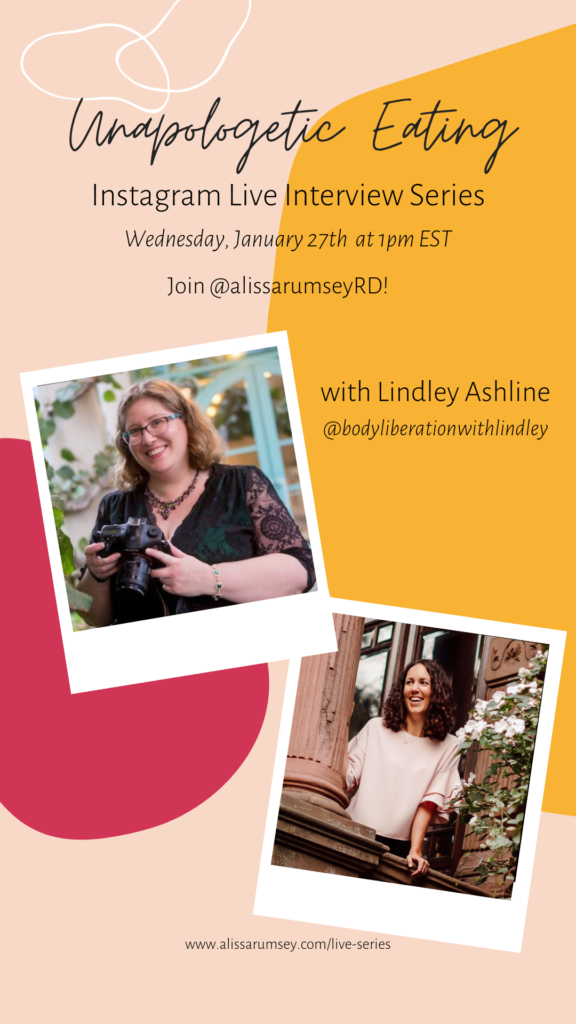
And I don’t see people like me in the media. I don’t see people bigger than me in the media. There might be one—Zelvi Damore, the fashion model, who is also wonderful, as far as I know. She is significantly fat. And every once in a while, a marketing campaign or a company will pull her and put her—and she is about my size. They will pull her and put her in a marketing campaign, and it’s startling, because she is so much larger. She’s like twice Ashley Graham size, if not more.
And when you see that very rare instant, you go, “Oh, my god. That person looks like me. My body is worthy of being seen too. My body is valid.”
And that is underlying all the representation that I am working on because we just don’t see ourselves. And there are people—I’ve heard some people who will go to my stock photo site, which is there at BodyLiberationPhotos.com, but it’s got its own URL as well. People will go to the stock photo section, and they’ll just browse, just to see bodies that look like theirs.
And it would be like going to Getty or iStock Photo, or any of the big competitors in stock photos. You just don’t see. And if you’re not familiar with stock photos, those are photos that get used in other companies’ marketing basically.
So when you don’t have big bodies in the stock photo collections, you don’t see them used elsewhere because they are not available.
And so it becomes this world where all we see is thin bodies, or maybe a medium-sized bodies, because it is used as representation.
And so seeing bodies that look like yours—not half your size, but positioned as being inclusive—bodies that look like yours, that have the same rolls, and the same folds, and the same curves, and the same size because what we see—
Emily Nagoski, in her book, Come As You Are, has some really fantastic things to say about seeing people like you. She says something like, seeing people like you, it shows us what’s acceptable and what’s achievable for people like you.
And there are very few people out there who are showing people of my size and bigger that they can be visible too. And it’s just mind-blowing when you finally see a bunch of people that look like you and go, “Oh, my god. They’re amazing and gorgeous and beautiful and valid.”
Alissa Rumsey: Thank you so much for sharing that because yes, the images—and I know this was a wake up I had as a thin person. I never thought about thin person, a white person, able-bodied. I had never thought about fat, about this, because when I look at TV and advertisements, I see people that look like me. But the implicit and sometimes explicit message that that sends, it’s like what you’re saying, is it sends this implicit message of what bodies are acceptable and what ones aren’t in our society.
And yes, I know that when, in working with clients, it’s a huge shift once they start. Because while we can’t completely curate everything we’re in-taking, certainly our own personal social media feeds, and when they start following people with diverse body sizes, and all these different things, this is like, “Oh, yes. This is real life.” All bodies exist. What we see in the media and in the news, it’s the tiniest percentage of what the bodies in this world actually look like.
And so yes, your work with that is so, so amazing. Just to bring that and have these, like you said, these stock images, when they’re writing news articles, or blogs, or just having the ability to have people use those different-sized bodies.
Lindley Ashline: Yes, and even things like—there’s actually a huge demand right now that as soon as it is safe to do multi-person photoshoots again that I’m really want to start working on is romance novels, of all things. There are so many newer romance novels out there with heroines and heroes in larger body sizes, and there are no photos for people to use for the cover.
So you have all these amazing romance novels of various kinds out there with really thin people on the cover, when that doesn’t actually reflect the characters.
Because there is nothing. Those options do not exist.
Alissa Rumsey: It doesn’t exist.
Lindley Ashline: And I know that romance novels seem like a really heady or silly thing to worry about, but it’s just one of the many, many, many. If you want to get more serious, there do not exist reliable, non-shaming, medical photos—and by reliable, I mean a large collection where people can go and find various things that they need—of medical, non-shaming medical photos, of healthcare photos to use, to have people in fat bodies either as the healthcare provider or the patient. It just doesn’t exist. So that’s on my list too.
Alissa Rumsey: I love it. I love it.
Switching gears a little bit, but I know you mentioned that this plays into a lot of the work that you do. I would love to hear from your perspective what being unapologetic in your life, what that means, and what that has shifted for you.
Lindley Ashline: Yes, I know in preparation for this talk, we were talking about unapologetic in both eating and living. And for me, very short version, I grew up without a TV. I was very isolated. And I didn’t have exposures to a lot of the diet culture messages that a lot of other people grew up with. So for me, getting to a point where I could eat unapologetically was reject dieting and diet culture. It’s a process like it is for everybody. But for me, it was pretty easy.
But I also live with an anxiety disorder. So for me, living unapologetically has been the big struggle, and one that I’m making great progress in. But that has been just living unapologetically, doing and being the things that are authentic for me. Because when you’ve been speaking about body image and about fat acceptance for a few years, you—and people run across you, they’re like, “How did you even get to this point? You’re so brave, You’re so bold. You’re this capital A activist, and I can never do that.”
And part of that has been that process of just being unapologetic and also, part of that is privilege. And I always point this out because I do run my own business, and I have the ability to speak about pretty much whatever I want. I don’t have an employer who will fire me. My cat threatens sometimes, but she hasn’t actually fired me yet.
And I have a financial safety net. I need to be very honest about that. My livelihood—I’m not going to lose my home if somebody’s ticked me off about what I say. That’s not really a thing.
So I have to be very honest about that too. I have white privilege. I have CIS gender privilege and straight privilege. And I am in a marginalized body, but I still have many privileges.
But beyond that too, and those things have supported me in being unapologetic. But it’s just been this process of building these layers because first, it was, I had been working a series of corporate jobs, and I was just increasingly miserable. And I just finally said I can’t do this anymore. I’m done apologizing for potentially being on the autism spectrum and having certain sensory needs while I’m working. I’m done apologizing for that.
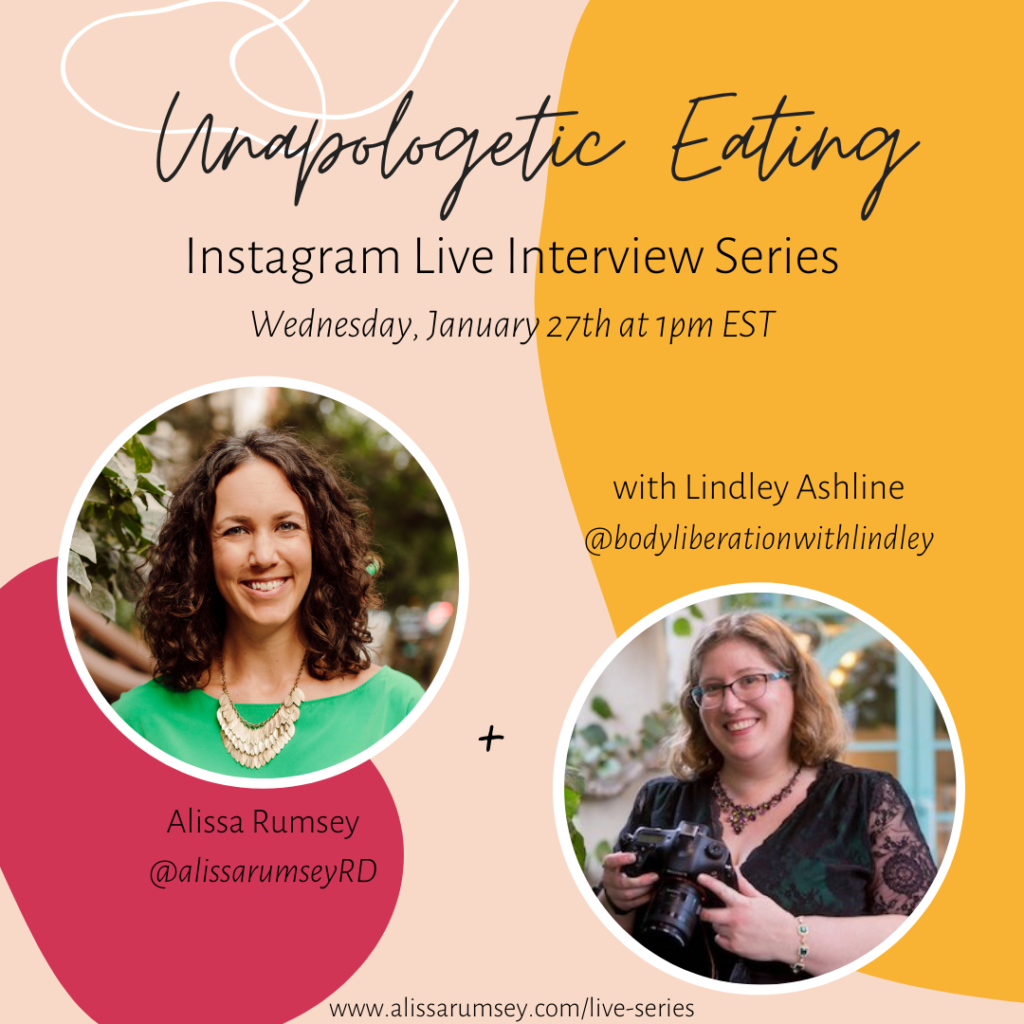
I’m done apologizing for being myself. I’m done apologizing for needing work that is stimulating and not toxic. And so I started my own business, and I quit my day job. And then I was going to be a body positive boudoir photographer. That was my original goal. And I still do that among many other things now. But I was very tentative about it. I was very sweetly body positive in a way that was very wishy washy because I was afraid to say fat bodies are awesome. I was afraid to say the word, “fat” in a business context. I was afraid to say I work with fat people. I was afraid to say these are the bodies that deserve representation […]
And so, I did a lot of very wishy-washy stuff, or I used a lot of euphemisms, and I did a lot of, “All bodies are good!”
And there’s nothing wrong with that. But it wasn’t authentic for me.
And for me, being unapologetic required me to get angry because I started doing this, and the more that I started getting into the body positive world, and the fat positive world, the more I saw how fat folks are under-represented and mistreated. And I got mad.
And so it turned out that for me, being unapologetic and authentic, it required more than just being a body positive photographer. I had to do more. I had to start speaking out about body image and about fat acceptance and about body acceptance and about power and discrimination and oppression. For me, it required that. And the less apologetic I got about that, the more powerful my voice got, and the more practice I got at it because that’s hard. I get trolled, I’ve gotten death wishes. And because I have some relative privileges, I also don’t experience as much harassment as some people who are in larger bodies or in black bodies or whatever. But I’ve gotten docked already.
The world is not kind to fat people who speak about the humanity of fat people. But that’s what it required for me to be unapologetic.
And so I have developed a strong support network. I have a great therapist. So for me, being unapologetic has also required me to develop the self-care and the community care mechanisms to support me in that. And that’s really important.
Alissa Rumsey: I’m so glad you brought that up because yes, it’s so, so difficult to, I think, for most people, divest from this mainstream diet culture, the anti-fat beliefs this idea of we have to look a certain way to be accepted and be valuable and be loved. It’s hard enough to do that without having some kind of support network.
A lot of people would be like, “I’m the only one in my life that’s not trying to get smaller, not trying to shrink myself.”
And so, thank you for bringing that up, the importance of finding community—yay for therapists as well.
Lindley Ashline: Oh, yeah… for sure.
Alissa Rumsey: Finding community and having that coping in place. I also loved how you said being unapologetic for you meant getting angry. And I think for those of us who can socialize as women, that’s generally something we’re taught not to be. It’s not okay. You want to be nice. I know for me, it’s like, “Oh, I don’t like confrontation.” It’s not because I don’t like it inherently. This was taught to me in a variety of ways, that confrontation was bad. Being angry was bad.
And I know, like you said, as white women, we don’t have nearly as bad as black people and black women in particular get that the angry black women trope all the time.
But yes, thank you for mentioning that too because I think sometimes people have this angry and aren’t really sure how to feel about that. But I love that you brought up that that was part of the process for you as well.
Lindley Ashline: I’m southern. I was raised to be a sweet southern white lady. We don’t do angry. We do passive-aggressive. And so I had to give myself permission, and to stop apologizing for being angry. And the thing is that anger can go on all sorts of direction, and there are unproductive and toxic uses of anger as well. But for me, a few months ago, I started calling my angry a sacred flame because it has sustained me through, not only being—like I’ve said, I’ve been docked, I’ve been harassed, and not it has sustained me through that because I don’t deserve that for saying that I deserve a seat on an airplane. The things that I’m saying are not actually—in the grand context of humanity, I’m not actually particularly radical.
I’ve been saying I deserve health care. I deserve all the things that people in bodies that are more socially acceptable than mine deserve. That is not actually all that radical. But it has sustained me through being mistreated for saying those things.
But also, through seeing the mistreatment that the people in bodies like mine get because when you develop networks of people who are marginalized in the same way that you are—in my case, groups full of fat folks.
You hear a lot of horror stories. And it’s hard. And I could choose to take that and shrink into it, and say nothing is ever going to change. The situation is so bad. But I got angry and I stopped apologizing for being angry, and that drives a lot of my writing, that drives a lot of my activism work. And it also keeps me from just shrinking and melting under being a very, very, very minor public figure.
Alissa Rumsey: Thank you so much for sharing that. My last question for you is, thinking about the people watching, thinking about people who are in this journey of working towards body liberation, working towards being unapologetic, and all these different areas of their lives, what piece of advice, I’m sure you have many, but what piece of advice would you share with those people?
Lindley Ashline: I think one of the things that I see—one of the situations that I see most often in people who are learning to be unapologetic, particularly, around their eating or their body size or not investing in diet culture anymore and being unapologetic about that is isolation. You’re the only one in your office who doesn’t want to talk about, “Oh, the bagels are so full of carbs. I can only have a third of a bagel today.” You’re the only one who doesn’t participate in that. You’re the only one who, at the family Thanksgiving table, doesn’t want to join in the diet talk. You’re the only one of your friends who’s not dieting.
And that’s a really tough position to be in because diet culture is not just—it’s awful and it’s toxic, but it’s also a bonding ritual. It’s part of how we bond with each other socially. And replacing that is hard. Losing that is hard.
And I say this from my own life too. I’m the only one in my biological family who is not dieting usually. So seek community. Find people who have bodies like yours on Instagram. Find people who are unapologetic in the way that resonates with you. Find Facebook groups. There are so many resources. In non-COVID times, there are lots of local, fat positive or body positive community groups who go out and do stuff together. Depending on where you live, there might be clothing swaps where you can find clothing in your size, and find community. Bond over that with some people.
So seek out those connection points. Seek out community that is good for you, that doesn’t make you feel bad about your body or yourself, and that learning to be unapologetic in that environment, and then taking that out into the wider world is way easier than being isolated and learning to be unapologetic all on your own.
Alissa Rumsey: I love that. Thank you so much for sharing. Do you still have that post up on your website that details the list of support groups and Facebook groups?
Lindley Ashline: I do. If you go to BodyLiberationPhotos.com, and in the search—click the search button at the top of the page and type in, “HAES groups,” H-A-E-S groups, it will come up. I’m actually going to be moving that to a Patreon reward soon, behind my Patreon wall, simply because some trolls have been using that as a list of targets. And that’s not okay. But as of right now, I think I’m moving that in a few weeks. And then it will be available on my Patreon which is linked from my website. And it will be available to everybody on the Patreon. I just wanted to put it behind a little bit of a wall, so that it wasn’t out in the public.
But yes, you can find that at HAES groups on my website, and my Patreon, to start, send a dollar a month, so that is not particularly taxing to access.
Alissa Rumsey: Really accessible. Great. Thank you so much, Lindley. I feel like there is so much more I want to talk to you about. So we’re just going to have to do this again. Thank you again so much for taking the time out of your day and for sharing with us. For those of you who are watching, we have—this is Day 3. So we have, let me do math, nine more days left. Nine more days? Yes. Nine more days left of the Interview series. And we also have a book launch party happening on February 9th, which is going to be super fun, and I’m going to be in conversation with a few other people around similar topics, and we’re going to have a DJ dance party, which I’m super excited about.
So links to the rest of the Instagram live series, as well as the book launch are in my bio. Thank you all so much for watching. Thank you again, Lindley, for being here with me.
Lindley Ashline: Thanks for having me.
Alissa Rumsey: Take care. Bye, everybody.
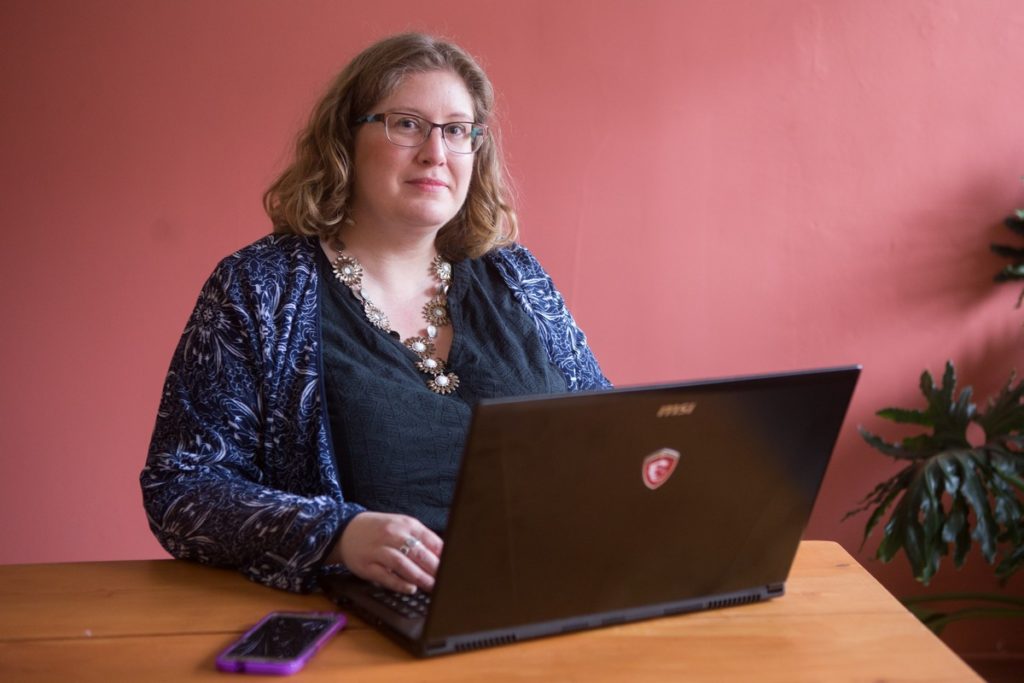
Let’s dig deep. Every Monday, I send out my Body Liberation Guide, a thoughtful email jam-packed with resources for changing the way you see your own body and the bodies you see around you. And it’s free. Let’s change the world together.
Hi there! I'm Lindley. I create artwork that celebrates the unique beauty of bodies that fall outside conventional "beauty" standards at Body Liberation Photography. I'm also the creator of Body Liberation Stock and the Body Love Shop, a curated central resource for body-friendly artwork and products. Find all my work here at bodyliberationphotos.com.

